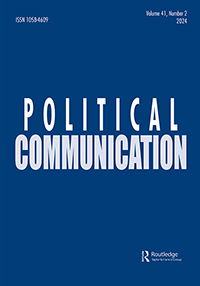“团结一致”效应如何塑造新闻媒体的信任:来自2019冠状病毒病大流行危机之前和期间专家组浪潮的证据
IF 4.6
1区 社会学
Q1 COMMUNICATION
引用次数: 3
摘要
在本研究中,我们扩展了有关“团结在旗帜周围”现象的文献,即国际危机倾向于导致公民对政治制度的认可增加。我们从三个方面推进这些文献,并强调其与政治传播研究的相关性:1)通过理论化和实证检验为什么集会效应应该在制度层面上扩展到对新闻媒体的信任的两个论点,2)通过提供经验证据来证明在国际危机期间,集会效应对媒体信任的影响是如何随着时间的推移而发展的,以及3)通过研究异质效应来理论化和检验集会效应对媒体信任更有可能发生的条件。通过危机前挪威公民对新闻媒体信任基线的面板设计,我们发现证据表明,COVID-19大流行危机的复合效应导致挪威对新闻媒体的信任持续增加,并且增加的程度因公民的教育程度和是否属于“高风险”群体而有所不同。我们还提供证据表明,集会对新闻媒体信任的影响取决于新闻媒体作为危机信息来源的重要性,以及媒体信任与政治信任之间的“信任关系”。这些见解扩展了我们目前对危机时刻如何影响新闻媒体信任的理解。本文章由计算机程序翻译,如有差异,请以英文原文为准。
How Rally-Round-the-Flag Effects Shape Trust in the News Media: Evidence from Panel Waves before and during the COVID-19 Pandemic Crisis
ABSTRACT In this study, we extend the literature on the rally ‘round the flag phenomenon, that is, that international crises tend to cause an increase in citizens’ approval of political institutions. We advance this literature and highlight its relevance for political communication research in three ways: 1) by theorizing and empirically testing two arguments for why rally effects should extend to trust in the news media on the institutional level, 2) by providing empirical evidence on how rally effects on trust in the media develop over time during an international crisis, and 3) by theorizing and testing the conditions under which rally effects on media trust are more likely to occur by studying heterogeneous effects. Through a panel design with a pre-crisis baseline of Norwegian citizens’ trust in news media, we find evidence to suggest that the compound effect of the COVID-19 pandemic crisis caused a long-lasting increase in trust in the news media in Norway, and that the degree of increase varied by citizens’ education and whether they belonged to a “high-risk” group. We also provide evidence to suggest that rally effects on news media trust are contingent on how important the news media is as a source of information about the crisis and the “trust nexus” between media trust and political trust. These insights extend our current understanding of how times of crisis affect trust in the news media.
求助全文
通过发布文献求助,成功后即可免费获取论文全文。
去求助
来源期刊

Political Communication
Multiple-
CiteScore
13.90
自引率
2.70%
发文量
30
期刊介绍:
Political Communication is a quarterly international journal showcasing state-of-the-art, theory-driven empirical research at the nexus of politics and communication. Its broad scope addresses swiftly evolving dynamics and urgent policy considerations globally. The journal embraces diverse research methodologies and analytical perspectives aimed at advancing comprehension of political communication practices, processes, content, effects, and policy implications. Regular symposium issues delve deeply into key thematic areas.
 求助内容:
求助内容: 应助结果提醒方式:
应助结果提醒方式:


